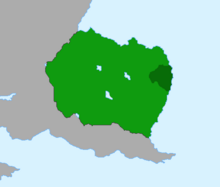Kembala language: Difference between revisions
Jump to navigation
Jump to search
Philimania (talk | contribs) mNo edit summary |
No edit summary |
||
| Line 49: | Line 49: | ||
[[Category:Kulimian languages]] | [[Category:Kulimian languages]] | ||
[[Category:Languages of the USRN]] | |||
Revision as of 01:20, 21 September 2023
This article is incomplete because it is pending further input from participants, or it is a work-in-progress by one author. Please comment on this article's talk page to share your input, comments and questions. Note: To contribute to this article, you may need to seek help from the author(s) of this page. |
| Kembala | |
|---|---|
| Ikembali | |
| Pronunciation | /ikɛmˈbɑːli/ |
| Native to | USRN |
| Ethnicity | Kembala |
Native speakers | (L1 speakers: 16 million. Combined L1 and L2 speakers: 142 million. cited 1999) |
| |
| Official status | |
Official language in | |
Recognised minority language in | X |
| Regulated by | Kembala Language Institute |
| Language codes | |
| ISO 639-1 | kb |
| ISO 639-2 | kmb |
| ISO 639-3 | kmb |
 Geographic distribution of the Kembala language. Dark green: native region (Kembalia). Medium green: spoken by a majority alongside native languages. | |
Kembala, also known by its local name Ikembali, is a Kambu language spoken natively by the Kembala people. It is also used as a lingua franca in the USRN, where it is the only official language at the federal level. It is estimated to be spoken by about 142 million people worldwide, 16 million of which are native speakers.